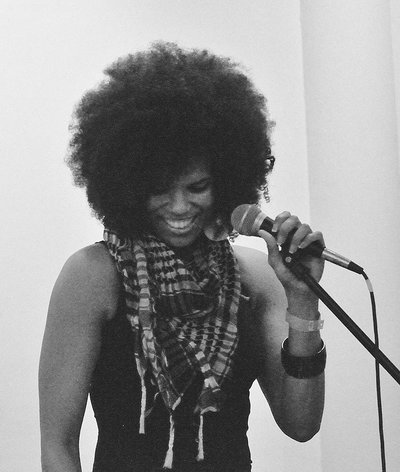
Dozens of people were turned away from the Bascom-Tykeson room at the Eugene Public Library Feb. 23. The room had reached its full capacity of 106 people well before Walidah Imarisha’s 2 pm talk “Why Aren’t There More Black People in Oregon? A Hidden History.” Several people watched through the windows from Broadway.
Imarisha, a professor in Portland State University’s Black Studies department, has been touring Oregon for three years giving the talk, with 12 stops this February in honor of Black History Month.
The event began with Imarisha directing the audience to grab a partner and inspect the timeline: documents describing key events in Oregon’s racial history hanging on the surrounding walls.
One document marked 1859 stated: “Oregon became the only state admitted to the Union with a racially exclusive law, written into the Constitution. It banned any ‘free negro, mulatto, not residing in this state at the time’ from living holding real estate and making any contracts within the state.”
“What were people’s initial reactions to the timeline?” Imarisha asked.
“I feel like we’re talking about a Southern state,” one woman said.
Another sheet marked 1994 describes the impact of Measure 11, the ballot that established mandatory minimum sentencing: “Black people account for just 4 percent of the state’s youth population, but 19 percent of Measure 11 indictments.”
“Because of the war on drugs and the criminalization of consensual crimes, there’s more people — more black people — in prison now than there were slaves back then,” said one man.
The conversation turned to “sunset towns,” — towns and cities that essentially banned people of color after sunset. Imarisha referred the audience to James W. Loewen’s book Sundown Towns and its corresponding website: wkly.ws/1oz. Loewen, the American sociologist and historian who wrote Lies My Teacher Told Me: Everything Your American History Textbook Got Wrong, provides information on each state and the cities that have or had sundown laws. Eugene, Springfield, Florence, Oakridge and Ashland, among others, are on Oregon’s list.
The last slide Imarisha presented was about the Black Panther Party. “There were two chapters of the Black Panther Party in Oregon and one was in Eugene and one was in Portland,” she said. At its height circa 1969, the BPP fed 10,000 children per day through its free breakfast program.